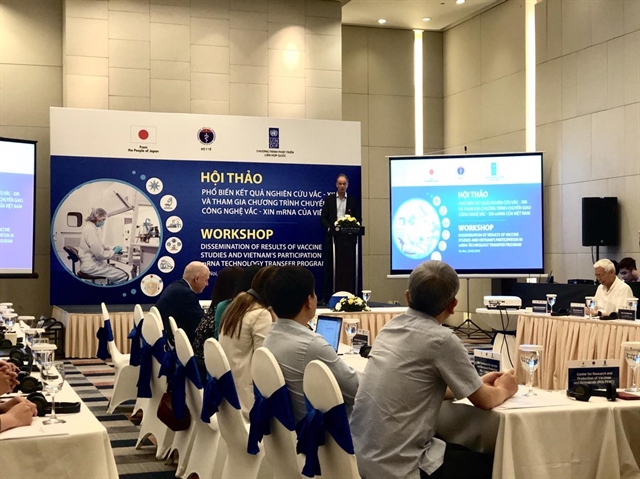 Society
Society

 |
| Patrick Haverman, Deputy Resident Representative of UNDP in Việt Nam, delivers a speech at the workshop on disseminating results of vaccine studies and Việt Nam's participation in the World Health Organisation's (WHO) mRNA technology transfer programme. Photo courtesy of the Ministry of Health |
HÀ NỘI — By leveraging international experience and collaborating with relevant parties, Việt Nam has the potential to become a leading country in the region regarding vaccine production, enhancing its capacity to access and produce vaccines to address future diseases.
This contribution to global efforts in responding to health crises was highlighted at a workshop held on Monday.
The workshop, jointly held by the United Nations Development Programme (UNDP), the Health Strategy and Policy Institute (HSPI) and the Ministry of Health, aimed to disseminate results on vaccine studies and Việt Nam's participation in the World Health Organisation's (WHO) mRNA technology transfer programme.
This is part of the project on enhancing vaccine access and health system capacity for Việt Nam's response to COVID-19, funded by the Government of Japan through the UNDP.
In coordination with HSPI, UNDP conducted three studies focusing on an overview of international experience in domestic vaccine development and production, a roadmap of Việt Nam's current vaccine production capacity, and international vaccine licensing policies and procedures.
The workshop provides an opportunity to share research results and discuss the next steps in applying these findings.
Experts at the workshop said that Việt Nam's participation in the WHO-initiated mRNA technology transfer programme marks an important step towards enhancing domestic capacity to access and produce vaccines.
Việt Nam is one of the 11 countries receiving technology transfer for mRNA vaccine production.
Speaking at the workshop, Dr Ong Thế Duệ, deputy head of the HSPI’s Department of Health Finance and Technology Assessment, said the COVID-19 pandemic had highlighted a clear picture of COVID-19 vaccine production and vaccine production in general.
"By last February, more than 10 billion vaccines had been administered worldwide, but in regions like Africa, up to 83 per cent of the population remained unvaccinated," Duệ said. "27 countries had a COVID-19 vaccination rate of less than 10 per cent of their population. Meanwhile, many other countries have already administered third doses to their citizens.”
By mid-2021, Việt Nam had one of Southeast Asia's lowest COVID-19 vaccine coverage rates.
“This vaccine inequality is not only happening with the COVID-19 vaccine but also with other types of vaccines," he emphasised.
Patrick Haverman, Deputy Resident Representative of UNDP in Việt Nam, said that in the last six months of 2021, with the support of COVAX and international organisations, Việt Nam became one of the countries with the highest COVID-19 vaccine coverage rates in the world. This has saved many lives and created important conditions for reopening and economic recovery.
"It is evident that vaccine access is crucial from both the perspective of routine immunisation programmes and emergency vaccines during the COVID-29 pandemic as well as future outbreaks," he said.
Being prepared for future pandemics
According to experts, the COVID-19 pandemic has ushered in a new era of vaccine development. Việt Nam has identified the need to enhance the production and certification of vaccines by applying and participating in the WHO programme on the technology transfer of mRNA vaccine production through Afrigen in Cape Town in South Africa.
"Enhancing Việt Nam's capacity will contribute to the production of routine vaccines for its expanded immunisation programme, which applies new technologies and approaches, as well as strengthens the capacity to respond to emerging diseases and future pandemics," he added.
At this workshop, experts proposed a roadmap to transform Việt Nam into a regional vaccine production centre, outlining the necessary steps and actions to enhance the country's vaccine production capacity and contribute to ensuring regional health security.
The workshop covered various important topics, including in-depth assessments of international experiences in vaccine development and production, focusing on mapping Việt Nam's current vaccine production capabilities and providing valuable information for future planning.
It also offered valuable insights into the technical aspects of mRNA vaccine production and the potential application of this vaccine in Việt Nam.
The workshop, with the participation of departments, agencies, institutes, enterprises, senior experts, and partners, aimed to build an effective national strategy to enhance vaccine access in Việt Nam and the wider region in the future.
Currently, there are four units involved in the research and production of COVID-19 vaccines, including the Company for Vaccine and Biological Production No1 (VABIOTECH), the Center for Research and Production of Vaccines and Medical Biologicals (POLYVAC), the Institute of Vaccines and Medical Biologicals (IVAC), NANOGEN Pharmaceutical Biotechnology Joint Stock Company.
According to the national strategy for developing Việt Nam's pharmaceutical industry by 2020 with a vision towards 2030, domestically produced vaccines will meet 100 per cent of the demand for an expanded immunisation programme by 2020 and 30 per cent of the demand for vaccine services; and produce multi-priced vaccines, including vaccines for disease prevention such as the COVID-19 vaccine by 2030. — VNS




